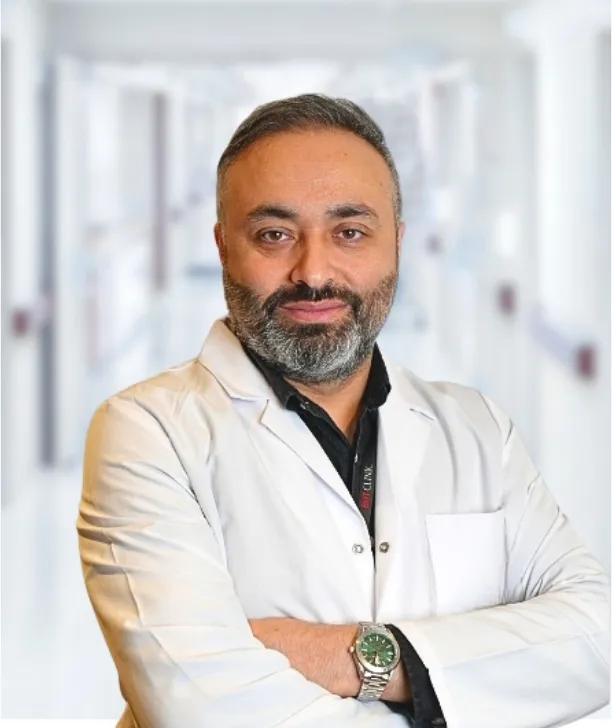- 2000+ Tumors
- 1500+ Spine
- 800+ Stimulation
- 40+ Publications
Prof. Dr. Mustafa Neurosurgeon
Assoc. Prof. Dr. Mustafa graduated from Eskişehir Osmangazi University Faculty of Medicine in 2007 and completed his residency in Neurosurgery at Şişli Etfal Training and Research Hospital in 2013. He later served at Malatya State Hospital and Harran University School of Medicine before earning his associate professorship title in 2020.
He has extensive experience in brain and spinal cord tumor surgery, cervical and lumbar herniation, spinal stabilization, deep brain stimulation (DBS), spinal cord stimulation, and trigeminal neuralgia procedures. He is also experienced in pediatric neurosurgery, including treatments for hydrocephalus and spinal cord anomalies.
With over 40 scientific publications, Dr. Mustafa is actively involved in both national and international congresses. He continues to combine surgical precision with academic excellence, contributing significantly to the field of neurosurgery.
Specialized Procedures
Hotel Accommodation Gallery






Hospital & Clinic Facility Gallery







Prof. Dr. Mustafa Video Gallery
Patient Testimonials
International Patient Reviews for Brain and Nerve Surgeon in Istanbul
Frequently Asked Questions
Advanced brain tumor surgery, spine surgery (cervical/lumbar), functional neurosurgery (DBS, trigeminal neuralgia treatments), and pediatric neurosurgery. Experience: 2000+ tumor cases, 1500+ spine operations, 800+ stimulation procedures, 40+ publications.
Anyone with a diagnosed brain/spine tumor, persistent neck–arm or back–leg pain from disc herniation/stenosis, Parkinson’s/essential tremor considering DBS, trigeminal neuralgia, or pediatric conditions like hydrocephalus.
Detailed MRI with contrast (± fMRI/DTI), tumor-board review, and a plan using neuronavigation, intraoperative neuromonitoring, and when needed awake mapping for speech/motor safety.
Yes—endoscopic skull base for pituitary/selected tumors, keyhole craniotomies, and tubular/minimally invasive techniques for spine to reduce pain and hospital stay.
Most single-level herniations are treated with microdiscectomy (remove the fragment). ACDF or lumbar fusion is reserved for instability, recurrent herniation, or multi-level disease. Decision follows exam + imaging.
A programmable neuromodulation system for Parkinson’s disease, essential tremor, dystonia when meds don’t control symptoms or cause side-effects. Candidates have responsive symptoms and suitable imaging. Batteries can be rechargeable or non-rechargeable.
If drugs fail or cause side-effects: Microvascular Decompression (MVD) for long-term relief when a vessel compresses the nerve; percutaneous rhizotomy or stereotactic radiosurgery are alternatives based on age, anatomy, and risk.
Both are available. ETV (endoscopic third ventriculostomy) restores CSF flow without hardware in suitable anatomy; otherwise a VP shunt is placed with modern programmable valves and infection-prevention protocols.
Brain tumor (uncomplicated): 3–5 nights hospital, plan 7–10 days total.
Cervical/lumbar microdiscectomy: 0–1 night, plan 3–5 days total.
DBS (bilateral): 2–3 nights, programming over 3–7 days.
Times vary by case.
Cervical/lumbar microdiscectomy: 0–1 night, plan 3–5 days total.
DBS (bilateral): 2–3 nights, programming over 3–7 days.
Times vary by case.
Bleeding, infection, CSF leak, neurologic deficit, hardware issues (DBS/shunt), or thrombosis. Risks are reduced with microsurgical technique, antibiotics, DVT prevention, neuromonitoring, and ERAS recovery pathways.
 English
English
 Spanish
Spanish  Russian
Russian  Portuguese
Portuguese  Italian
Italian  Polish
Polish 

